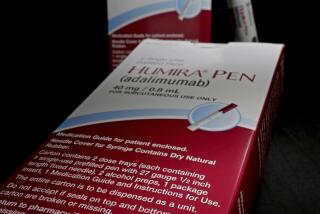FDA OKs Genentech Drug for Asthma
- Share via
The Food and Drug Administration on Friday approved Genentech Inc.’s Xolair, the first biotech drug to treat asthma.
The injectable drug will cost as much as $12,000 a year, substantially more than current asthma treatments, and will reach the market within two weeks, Genentech said.
Xolair could shift “the asthma treatment paradigm,” said analyst Jennifer M. Chao of RBC Capital Markets, who forecast sales of $136 million by 2004. However, some analysts believe Xolair’s hefty price tag could limit its use, perhaps severely.
The FDA approved Xolair for adults and adolescents suffering from allergic asthma -- breathing difficulties triggered by such things as dust mites, pets and cockroaches -- that isn’t controlled by inhaled steroid treatments. Genentech said 500,000 of the 10 million patients with asthma fall into that category.
Consultant Ajit Baid of Frost & Sullivan said it could take five years for sales of Xolair to reach $100 million.
“Cost is going to be the issue,” said Mission Viejo allergist William E. Berger, an investigator in a Genentech-sponsored clinical trial of the drug and president of the American College of Allergy, Asthma and Immunology.
South San Francisco-based Genentech will market Xolair with Swiss drug maker Novartis. The two companies will share the profit. Another beneficiary is a small Houston company, Tanox Inc. Tanox, Novartis’ partner, became entangled in a legal dispute with Genentech over the drug before reaching a settlement. Tanox will receive a 10% royalty on Xolair sales.
The medication arrives at a time when the cost of biotech drugs is coming under scrutiny. A recent study by Medco Health, a pharmacy benefits manager, found that expenditures on specialty drugs -- to treat hepatitis, rheumatoid arthritis and other diseases -- will increase 27% annually through 2005, compared with a 14% to 18% increase in overall drug spending.
As costly biotech drugs become more widely used, insurers and employers will face tough choices, said Terry Preskar, Medco vice president for specialty therapeutics. “These therapies are so costly, in the blink of an eye you can spend millions of dollars,” he said. “It can hamper the ability to provide oral drugs to everyone else.”
Xolair blocks a protein involved in the biological cascade that leads to allergic reactions such as wheezing and shortness of breath. Xolair prevents allergic symptoms, unlike existing medicines that don’t prevent such symptoms as weepy eyes and shortness of breath. Genentech also plans to study the drug in patients with other allergic conditions, including hay fever, and patients with allergies to latex and possibly peanuts.
Diane L. Parks, the Genentech vice president charged with marketing Xolair, said the company is collecting data to show that patients on Xolair require fewer emergency treatments and hospitalizations and less time away from work.
Xolair is expensive in part because it is difficult to make, Genentech said. Like all biotechnology medicines, Xolair is produced in live cells that are kept at precise temperatures and must be closely monitored.
Parks said managed-care organizations probably will require pre-authorization before agreeing to cover prescriptions for Xolair. Insurers also might require patients to try less expensive therapies first, analysts said. WellPoint Health Networks Inc., the parent of Blue Cross of California, plans to decide its reimbursement on Xolair in July.
A drawback of Xolair, said Frost & Sullivan’s Baid, is that it is an add-on therapy used in combination with inhaled steroids, which cost $1,200 to $1,800 a year. “Xolair is not really an essential kind of product,” he said.
Still, the drug has made a difference for some patients. Diana Niteo, 47, has been waiting for Xolair to reach the market since she tried it in a clinical trial two years ago. “I could breathe for the first time in years,” she recalled.
After she stopped using Xolair in May 2001, her symptoms returned despite inhaled steroids and other drugs. In December, a severe asthma attack brought on by her allergies put her in the hospital.
Niteo, a classroom aide from Mission Viejo, said she will make financial adjustments if the medicine is not covered by insurance. “You can have a beautiful house,” she said, “but it is nothing if you can’t breathe.”
Genentech’s shares closed at $74.32, up 25 cents, while Novartis fell 30 cents to $41.30; both trade on the New York Stock Exchange. Tanox’s stock rose 12 cents to $16.81 on Nasdaq.
More to Read
Inside the business of entertainment
The Wide Shot brings you news, analysis and insights on everything from streaming wars to production — and what it all means for the future.
You may occasionally receive promotional content from the Los Angeles Times.










